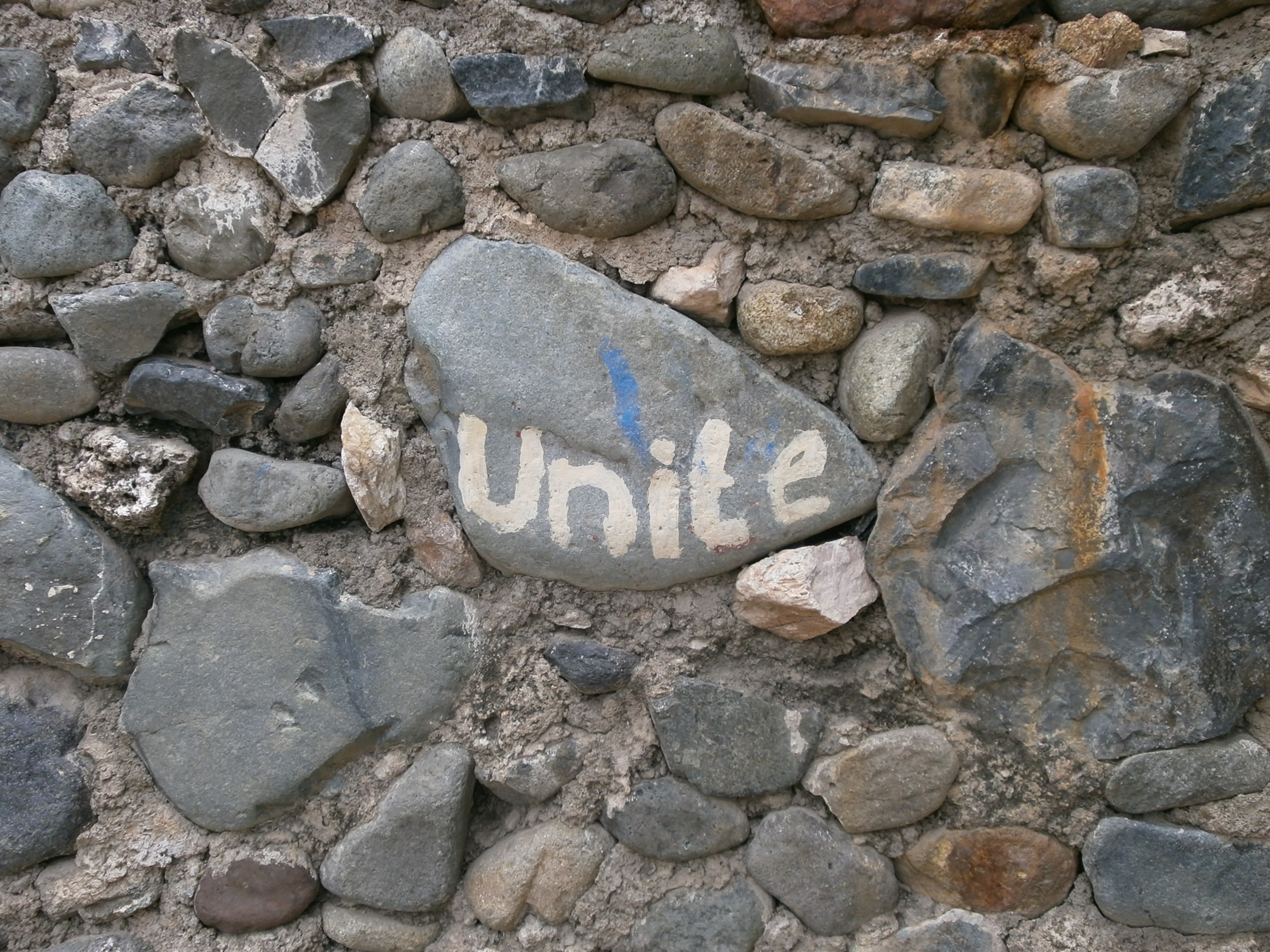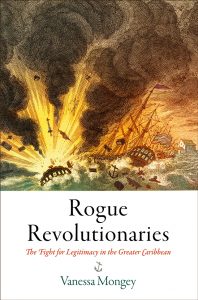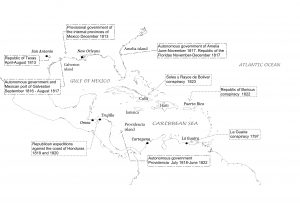This digital companion is a “making of” of the cosmopolitan revolutionary moment documented in my book Rogue Revolutionaries.
Page Contents
Media appearances:
Listen to the New Books Network podcast here.
Listen to the Sea Control episode “Maritime Insecurity in the Age of Revolutions” here.
Rogue Revolutionaries won the 2020 Chinard book prize from the Society for French Historical Studies. The prize money was donated to support contingent scholars.
What is the book about?
Book flyer PDF: flyer.
Rogue Revolutionaries: The Fight for Legitimacy in the Greater Caribbean (University of Pennsylvania Press, 2020) tells the vivid tale of an international cast of characters who repeatedly tried to overthrow colonial monarchy and create independent countries.
These men were state-entrepreneurs who barged through borders. They were not members of the elite: they were sailors, ship captains, merchants, teachers, and journalists. They came from France, Spain, Haiti, Guadeloupe, West Africa, and the United States. Complicated characters, they funded their dreams of world liberation on slave trading and threats of violence.
They claimed revolution as a universal right. They embedded this right within republican ideals of liberty and equality. The right to revolution evolved in tension with hardening nationalisms and a new international system. They slowly disappeared as new protocols for recognizing sovereignty and legitimacy were put in place.
This book resurrects the alternatives that lived in the shadows of national and imperial histories. Discarded as piratical nests or picaresque anomalies, these almost- and not quite-countries remind us of the importance of studying failures, dead ends, and the unpredictable nature of history.
Introduction and Table of Contents at University of Pennsylvania Press (enter promo code PP20 at checkout to receive a 20% discount)
USA: Bookshop ♦ Barnes & Noble
U.K.: Hive ♦ Blackwell’s ♦ Waterstones
Europe: Combined Academic Publishers
This book is also available from your local Amazon site.
Reviews
“By focusing on the lives of adventurers who wandered through the Greater Caribbean during the Age of Revolutions, Vanessa Mongey’s excellent book offers an interpretation of the transition from empires to nations that can help us rethink the presumed inevitability of this transition. Her analysis of these failed revolutionary adventurers makes it possible to imagine an alternative political map of the Americas, in which small republics that ended up being ephemeral could have coexisted with the national states of our own present.”—Ernesto Bassi, Cornell University
“Rogue Revolutionaries is a surprising and enlightening book. Vanessa Mongey has given us a panoramic history of the ephemeral cosmopolitan revolutions that repeatedly bloomed and faded in the post-Haitian Revolution Caribbean. Historians of the early United States, and scholars of the revolutionary era more broadly, will want to reckon with the story she tells.”—Nathan Perl-Rosenthal, University of Southern California
“Engaging and accessibly written, Rogue Revolutionaries captures a failed 1822 uprising in the best tradition of Thompsonian radical history … Focusing not on elite actors or intellectuals, Mongey writes about common sailors and soldiers who dared to dream of a revolutionary reality inspired by the biggest ideas of the Age of Revolutions … With a “cosmopolitan patriotism” influenced by French universalism and a diverse cast of characters including French, Haitian, Continental European, and Latin American insurgents, Rogue Revolutionaries offers a striking history of the possible.” — Gilbert Chinard Book Prize Committee, Society for French Historical Studies (winner 2020)
“Mongey asks whether these seemingly ragged edges of the Age of Revolutions were quite a bit closer to the era’s common cloth than narratives of lasting revolutionary state formation in the late eighteenth and early nineteenth centuries have led us to believe … The most important contribution of Rogue Revolutionaries is the way it decenters national narratives .. Graduate students and academics will learn a great deal about state building while the book’s lively profiles of insurgents will engage undergraduates studying the Age of Revolutions.”— Jesse Cromwell, University of Mississippi
“Through Mongey’s skillful analysis, the stories of failed military ventures and forgotten state founders, which have often been sidelined as cases of mere “adventure” or “piracy”, turn into a thought-provoking discussion of what constituted legitimate claims to statehood during a moment of upheaval and uncertainty.” — Jan Jansen, Universität Duisburg-Essen
List of archives
This curated list of archives used in the book Rogue Revolutionaries is based on ease of access and availability of digitized collections.
Primary sources and historical documents
Selection of sources and interpretations used in Rogue Revolutionaries.
Map of revolutionary projects
Cast of characters
Louis-Michel Aury: Born near Paris, France; joined the navy during the revolution as a sailor; deserted his post in the West Indies; became an independent corsair; appointed commandant general of the naval forces of the Republic of Cartagena; clashed with Simón Bolívar; embarked on a more independent career, setting up headquarters on the islands of Galveston (1816-17), Amelia (1817), and Providencia (1819-21).
Benjamin and Philippe, alias Titus Bigard: Brothers born in Guadeloupe, France; served in the revolutionary corsair fleet; moved to Swedish colony of St. Barthélemy; set up a mercantile house; lobbied for voting rights and political representation of free men of color; funded an expedition against Puerto Rico in 1822.
Agustín Codazzi: Born in Lugo, northern Italy; enlisted in the Napoleonic army; crossed the Atlantic Ocean in 1817 to join the Spanish American independent movements on Amelia and Providencia; returned to Italy and bought a farm; became a cartographer and geographer in Venezuela, and New Grenada; recruited German migrants for Venezuela; died in Colombia.
Manuel Cortés Campomanes: Born in Madrid, Spain; began his career as a professor; instigated the anti-royalist San Blas conspiracy; deported to Venezuela where plotted an anti-colonial coup; worked with Spanish American insurgent exiles in London; joined the first republic of Venezuela in 1811; moved to the Republic of Cartagena; participated in an expedition against Mexico from Galveston, Texas, in 1817; became an editor and bookseller in Belgium.
Sévère Courtois: Born in Ouanaminthe, northern St. Domingue, France; left colony first for Cuba and then for Louisiana; enlisted in a battalion of free men of color in the Battle of New Orleans of the Anglo-American War of 1812; joined the Republic of Cartagena; served in Simón Bolívar’s army; became an independent privateer; moved to Providencia, Western Caribbean; oversaw the unification of Providencia to the Republic of Gran Colombia; participated in revolutionary conspiracy against Cuba in 1823.
Henri Louis La Fayette Villaume Ducoudray-Holstein: Born in Schwedt, north-eastern Germany; volunteered in the French army; captured in Spain; escaped to the United States; enlisted in the Republic of Texas in 1813; joined the Republic of Cartagena; became Simón Bolívar ‘s chief of staff; plotted a revolutionary expedition against Puerto Rico in 1822; settled as a language teacher and a writer in Albany, New York.
Costante Ferrari: Born in Reggio, northern Italy; joined Napoleonic army; volunteered for South American independence movements at Amelia and Providencia; returned to Italy and bought a farm with Codazzi; fought in the Greek war of independence; fought in a liberal rebellion in Italy in 1831; traveled to Venezuela in 1834-5; led a battalion of volunteers in the Italian revolutions of 1848; died in Reggio.
Marcelin Guillot: Born in St. Domingue, France; evacuated during the revolution probably to Cuba and then to Louisiana; enlisted in the battalion of free people of color in New Orleans during the Anglo-American War of 1812; moved to Galveston, Amelia, and Providencia; fought in the Battle of Lake Maracaibo with the republican forces in 1823; became an army officer in Gran Colombia.
Baptis Irvine: Born in Baltimore, eastern United States; journalist; fought with the Maryland militia during the Anglo-American War of 1812; promoted the cause of Spanish American independence as the newspaper editor of the New-York Columbian; served as U.S. special agent in Venezuela in 1818; participated in a revolutionary plot against Puerto Rico in 1822.
Georges-Nicholas Jeannet-Oudin: Born in Arcis-sur-Aube, north-central France; his brother was an army general and his uncle, George Danton, was a political leader during the revolution; posted in Guyana (April 1793-November 1794 and April 1796-November 1798) and in Guadeloupe (1800); recalled to the metropole; fled to North America and founded the Champ d’Asile colony in Texas in 1818; led a revolutionary expedition against Puerto Rico in 1822; died in France.
Juan Bautista Picornell: Born in Palma de Mallorca, Spain; joined scientific and literary societies; taught in Madrid; wrote treatises on education and pedagogy; involved in the 1796 anti-royalist San Blas conspiracy; transported to Venezuela where participated in the anti-colonial La Guaira conspiracy; took refuge in the United States; joined the first Republic of Venezuela in 1811; returned to the United States; joined an expedition against Texas; became president of the “provisional government of the free men of the Interior Provinces of Mexico” in 1813; rallied the Spanish royalist cause in New Orleans; died in Cuba.
Joseph Savary: Born in Saint-Marc, western St. Domingue; went to Cuba and Louisiana; joined Spanish American insurgent movements on the Louisiana/Texas border; participated in the republic of Texas in 1812-13; led a battalion of free men of color during the Battle of New Orleans in 1815; moved to Galveston Island; settled in New Orleans with his wife Eugenie, also native of St. Domingue.


